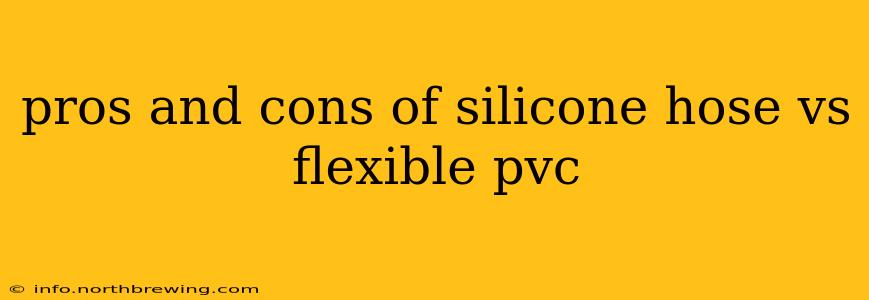Choosing the right hose for your application depends heavily on the specific demands of the job. Silicone and flexible PVC hoses both offer flexibility, but their properties differ significantly, leading to distinct advantages and disadvantages. This in-depth comparison will help you determine which material best suits your needs.
What are Silicone Hoses Used For?
Silicone hoses excel in high-temperature applications and environments requiring excellent resistance to chemicals and weathering. Common uses include automotive applications (boost hoses, coolant hoses), industrial processes involving high heat, and even food and beverage industries where cleanliness and inertness are paramount.
What are Flexible PVC Hoses Used For?
Flexible PVC hoses are a versatile and cost-effective option suitable for a wider range of applications. Their flexibility and resistance to many chemicals make them ideal for general-purpose uses like gardening, water transfer, and some industrial processes where temperature requirements are moderate.
Silicone Hose: Pros and Cons
Pros of Silicone Hose:
- High Temperature Resistance: Silicone hoses can withstand significantly higher temperatures than PVC hoses, often operating effectively at temperatures exceeding 200°C (392°F). This makes them perfect for high-heat environments.
- Chemical Resistance: Silicone is highly resistant to a broad spectrum of chemicals, including acids, bases, and oils, making them suitable for applications involving aggressive substances.
- Flexibility and Durability: While not as flexible as some PVC options, silicone hoses are still relatively flexible and offer excellent durability, withstanding repeated bending and flexing without cracking or breaking.
- UV Resistance: Silicone hoses are highly resistant to ultraviolet (UV) degradation, making them suitable for outdoor applications where prolonged sun exposure is a concern.
- Food-Safe Options Available: Many silicone hoses are manufactured to meet food-grade standards, making them safe for use in food and beverage applications.
Cons of Silicone Hose:
- Higher Cost: Silicone hoses are generally more expensive than their PVC counterparts.
- Permeability to Some Gases: While resistant to many chemicals, silicone can be somewhat permeable to certain gases, a factor to consider in specialized applications.
- Susceptibility to Certain Solvents: Although generally chemically resistant, some solvents can cause degradation or swelling of silicone hoses.
- Less Abrasion Resistance (Compared to Some Other Materials): While durable, silicone may not be the best choice in high-abrasion applications.
Flexible PVC Hose: Pros and Cons
Pros of Flexible PVC Hose:
- Lower Cost: PVC hoses are significantly more affordable than silicone hoses, making them a budget-friendly option.
- Wide Availability: PVC hoses are readily available from a wide range of suppliers.
- Good Flexibility: PVC hoses typically offer excellent flexibility, making them easy to maneuver and install.
- Resistance to Many Chemicals: PVC exhibits good resistance to many chemicals and oils.
Cons of Flexible PVC Hose:
- Lower Temperature Resistance: PVC hoses have a much lower temperature tolerance compared to silicone hoses; they can soften or degrade at temperatures well below 100°C (212°F).
- Limited UV Resistance: Prolonged exposure to sunlight can degrade and weaken PVC hoses.
- Brittle at Low Temperatures: In cold environments, PVC hoses can become brittle and prone to cracking.
- Less Chemical Resistance Than Silicone: While resistant to many substances, PVC is not as universally resistant to chemicals as silicone.
Which Hose is Right for You? A Quick Guide
This table summarizes the key differences to assist in your decision:
| Feature | Silicone Hose | Flexible PVC Hose |
|---|---|---|
| Temperature Resistance | High (up to >200°C) | Low (typically <100°C) |
| Chemical Resistance | Excellent | Good, but less than silicone |
| UV Resistance | Excellent | Poor |
| Cost | High | Low |
| Flexibility | Good | Excellent |
Ultimately, the best choice depends entirely on the specific requirements of your application. If you need a hose for high-temperature, chemically aggressive environments, silicone is the superior option despite the higher cost. For general-purpose applications where temperatures remain moderate and chemical exposure is minimal, a flexible PVC hose offers a cost-effective and readily available solution.
Frequently Asked Questions (FAQ)
Can I use silicone hose for drinking water?
While some silicone hoses are food-grade, always ensure the specific hose you are considering is certified for potable water use before employing it in a drinking water system.
Is PVC hose safe for food contact?
Generally, PVC hose is not considered safe for food contact. There are specific food-grade PVC options, but these are far less common than food-grade silicone hoses. Always check the manufacturer's specifications.
How long do silicone and PVC hoses last?
The lifespan of both types of hoses depends heavily on the application and environmental conditions. Silicone hoses, due to their superior resistance to degradation, often have a much longer lifespan than PVC hoses, particularly in demanding environments.
Can I repair a damaged silicone or PVC hose?
Minor repairs might be possible using specialized adhesives, but replacing a damaged hose is often more practical and reliable, especially in critical applications.
This comprehensive comparison should provide a clearer understanding of the distinct properties and applications of silicone and flexible PVC hoses, helping you make an informed decision for your next project. Remember to always consult the manufacturer's specifications for detailed information and safety guidelines.
